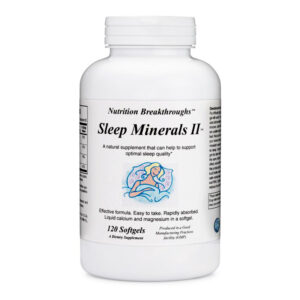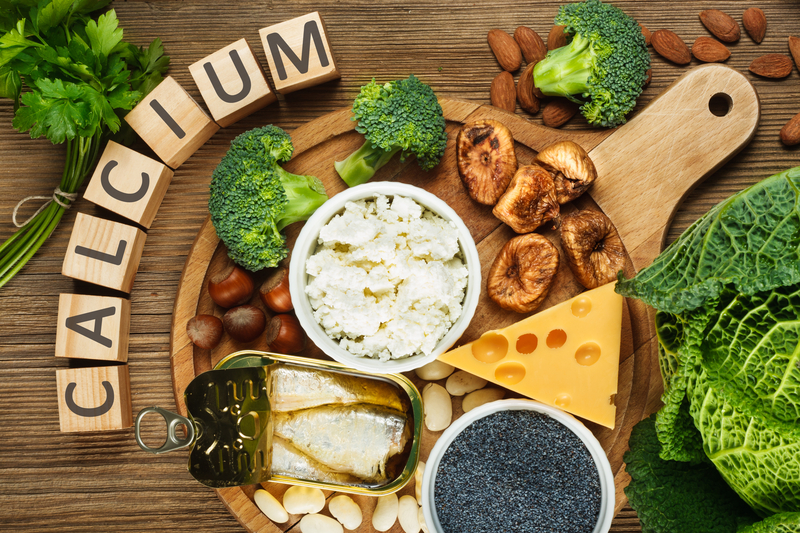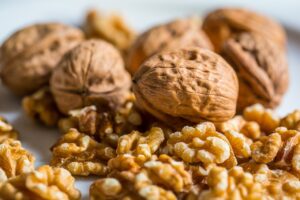 Ingredients in Sleep Minerals II Proven Effective as Natural Sleep Aids
Ingredients in Sleep Minerals II Proven Effective as Natural Sleep Aids
According to the National Sleep Foundation (NSF), almost six out of ten Americans report having sleep problems and insomnia at least a few nights a week.
Insomnia is defined as “An inability to fall asleep or remain asleep long enough to feel rested, especially when the problem continues over time.”
In an effort to combat this, as many as 25 percent of the people in the United States use medications to help them sleep. Most sleeping pills, especially when taken over long periods of time, stay in the bloodstream, give a hangover effect the next day and beyond, and impair memory and performance on the job and at home.
From a nutritional perspective, several research studies have shown certain minerals to be effective as natural sleep aids that help people fall asleep and stay asleep through the night. James F. Balch, M.D., author of Prescription for Nutritional Healing, writes: “A lack of the nutrients calcium and magnesium will cause you to wake up after a few hours and not be able to return to sleep.”
Calcium is directly related to our cycles of sleep. In one study, published in the European Neurology Journal, researchers found that calcium levels in the body are higher during some of the deepest levels of sleep, such as the rapid eye movement (REM) phase. The study concluded that disturbances in sleep, especially the absence of REM deep sleep or disturbed REM sleep, are related to a calcium deficiency. Restoration to the normal course of sleep was achieved following the normalization of the blood calcium level.
 William Sears, M.D. writes: “Calcium helps the brain use the amino acid tryptophan to manufacture the sleep-inducing substance melatonin. This explains why dairy products, which contain both tryptophan and calcium, are one of the top sleep-inducing foods.”
William Sears, M.D. writes: “Calcium helps the brain use the amino acid tryptophan to manufacture the sleep-inducing substance melatonin. This explains why dairy products, which contain both tryptophan and calcium, are one of the top sleep-inducing foods.”
Regarding magnesium deficiency, chronic insomnia is one of the main, central symptoms. Sleep is usually agitated with frequent nighttime awakenings. On the other hand, a high magnesium, low aluminum diet has been found to be associated with deeper, less interrupted sleep.
The benefits of magnesium was proven in a study done by James Penland at the Human Nutrition Research Center in North Dakota. The study was titled “Effects of trace element nutrition on sleep patterns in adult women.”
Note that a balanced ratio of calcium and magnesium is important to overall health, and these two minerals should be taken together in a two to one ratio for best results (twice as much calcium as magnesium).
Beyond being effective sleep remedies, the health benefits of calcium and magnesium are many. Studies have proven calcium to increase bone health, reduce high blood pressure, relax the nerves and muscles, prevent colon cancer and remedy kidney stones. Magnesium is an effective nutrient for strengthening heart health, reducing diabetes, and treating migraines, restlessness and depression.
are many. Studies have proven calcium to increase bone health, reduce high blood pressure, relax the nerves and muscles, prevent colon cancer and remedy kidney stones. Magnesium is an effective nutrient for strengthening heart health, reducing diabetes, and treating migraines, restlessness and depression.
Jobee Knight, a nutritional researcher and founder of Nutrition Breakthroughs in Glendale, CA., is someone who fought her own battle against sleeplessness and insomnia. She decided to put her background to use by searching out effective natural ingredients for relaxation and deeper sleep. The result was Sleep Minerals II, a natural sleep aid which contains absorbable forms of calcium, magnesium, vitamin D and zinc – all combined in a softgel with carrier oils. Oils such as rice bran oil have been shown to increase mineral absorption.
Chris M. of the United Kingdom says: “I take one softgel of Sleep Minerals II before bed every night and within 20 minutes I am asleep. The difference in the quality of my sleep and the ease with which I get to sleep using this product is monumental. I have stopped obsessing about sleep or dreading bedtime — I just take a softgel and drift off. If I stop taking them, within a week my sleep starts to lighten in quality, the amount of my sleep diminishes, and my old insomniac patterns reappear.”
Darleen T. of La Mesa, California says: “I purchased Sleep Minerals for my teenage daughter. When she started on the minerals she hadn’t been sleeping well for the past couple of years. She was run down and feeling beyond her years… exhausted. She is only 18. Once she started on Sleep Minerals she actually became tired at night, which is new. She can fall into a restful sleep by 10:30 p.m. and sleep all night. This product is a heaven-send and has given her a life back.”
Natural minerals for sleep that are combined in an effective formula are a much better option then enduring heavy side effects from sleeping drugs. For more information, visit the Sleep Minerals II page.




